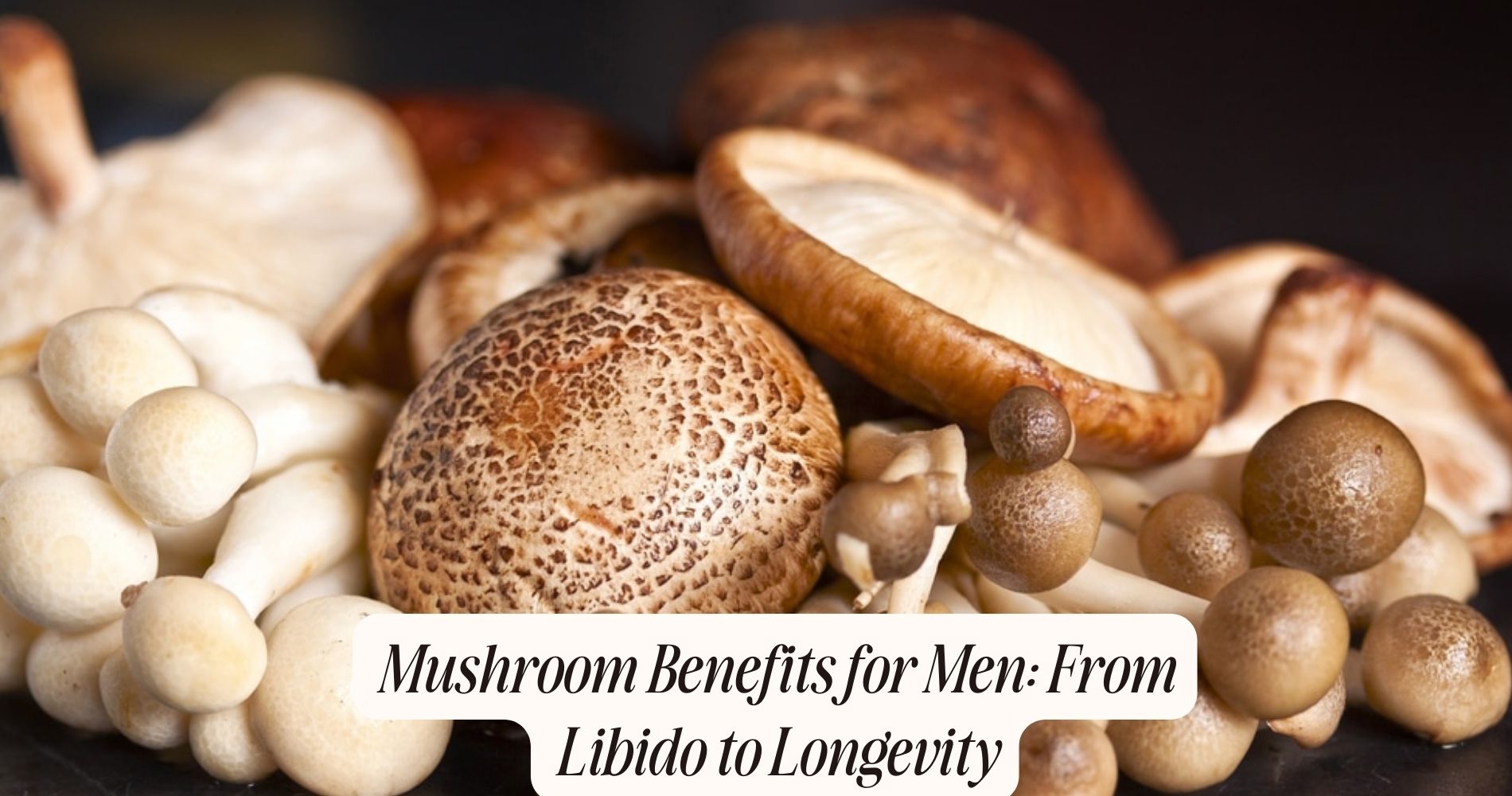
Are Mushrooms Good for a Diet? Weight Loss and Nutritional Value
Are mushrooms good for a diet? Mushrooms are exceptionally low in calories, containing only about 15 calories per cup, yet they are rich in crucial nutrients such as B vitamins and vitamin D. They also provide essential minerals like selenium and potassium and boast high antioxidant properties. With their content of dietary fiber and protein, mushrooms help promote satiety, which aids in maintaining digestive health and supporting a calorie deficit. As a versatile culinary ingredient, mushrooms can enhance various meals and even act as a meat substitute, making them an excellent choice for anyone looking to improve nutrient intake and overall satisfaction with their diet. Dive deeper to discover the extensive benefits of including mushrooms in your diet.
Low-Calorie Content
Mushrooms are an excellent addition to a diet because they contain very few calories while providing essential nutrients. When you're looking to manage your caloric intake, mushrooms offer a perfect solution. A cup of raw mushrooms contains only about 15 calories, making them one of the lowest-calorie foods you can include in your meals. This makes it easier to control your portions without worrying about consuming too many calories.
By incorporating mushrooms into your diet, you can maintain a balanced caloric intake while still feeling satisfied. Their low energy density means you can eat larger portions without greatly increasing your total calorie consumption. This is particularly beneficial if you're aiming for portion control, allowing you to enjoy more substantial meals that are still aligned with your dietary goals.

Moreover, mushrooms' low-calorie content can help you create a calorie deficit, which is essential for weight loss. By substituting higher-calorie ingredients with mushrooms, you can reduce your overall caloric intake without sacrificing flavor or fullness. Incorporating mushrooms into your meals can be a strategic move to support your weight management or weight loss efforts effectively.
Rich in Nutrients
You'll find that mushrooms are packed with essential vitamins such as B vitamins and vitamin D, which play important roles in energy metabolism and immune function.
Despite their low-calorie content, they're also a rich source of minerals like selenium, potassium, and copper, which are essential for maintaining overall health.
Including mushrooms in your diet can help you meet your nutritional needs without adding unnecessary calories.
High in Vitamins
Packed with essential vitamins like B-complex, vitamin D, and antioxidants, these fungi offer a nutrient-dense addition to your diet. Mushrooms are an excellent source of B-complex vitamins, including riboflavin, niacin, and pantothenic acid. These vitamins play essential roles in energy metabolism, helping your body convert food into fuel efficiently.
Additionally, mushrooms are one of the few natural sources of vitamin D, which is important for immune support and bone health. When exposed to sunlight, mushrooms synthesize vitamin D, boosting your intake of this important nutrient.
The antioxidant properties of mushrooms also contribute to their health benefits. Antioxidants help neutralize free radicals in your body, reducing oxidative stress and potentially lowering the risk of chronic diseases. Ergothioneine and glutathione, two potent antioxidants found in mushrooms, are particularly noted for their protective effects.
While mushrooms are rich in vitamins and antioxidants, it's important to consume them as part of a balanced diet. Don't rely solely on mushrooms for all your nutritional needs. Instead, use them to complement other nutrient-dense foods.
Integrating mushrooms into your meals can enhance your overall nutrient intake and support a healthy lifestyle.
Low Calorie Content
When considering foods that are low in calories yet rich in essential nutrients, it's hard to overlook the benefits of incorporating mushrooms into your diet.
Mushrooms are exceptionally low in caloric content, making them an ideal choice for those aiming to achieve or maintain a caloric deficit. A single cup of raw mushrooms contains merely about 15 calories, offering substantial volume without greatly impacting your daily caloric intake.
From a weight management perspective, the high nutrient density of mushrooms is remarkable. They provide a wealth of vitamins and minerals, such as B vitamins and selenium, while being virtually fat-free and low in carbohydrates. This nutrient profile supports overall health and can help you feel full and satisfied, which is important when following a calorie-restricted diet.
Moreover, mushrooms contain dietary fiber, particularly in the form of beta-glucans, which can enhance satiety and reduce overall food consumption. By integrating mushrooms into your meals, you can create dishes that are both filling and nutritionally balanced, aiding in sustainable weight loss.
Mineral Rich Source
In addition to their low calorie content, mushrooms are a rich source of essential minerals, such as potassium, iron, and copper, which play important roles in maintaining various bodily functions. Potassium helps regulate fluid balance, muscle contractions, and nerve signals.
Incorporating mushrooms into your diet can support cardiovascular health by counteracting high sodium levels, thereby promoting healthy blood pressure. Iron is essential for the production of hemoglobin, which carries oxygen throughout your body.

While plant-based iron isn't absorbed as effectively as iron from animal sources, mushrooms contain compounds that can enhance iron absorption. For instance, certain types of mushrooms have high levels of vitamin D, which can improve your body's ability to absorb iron.
Copper is another key mineral found in mushrooms, contributing to iron absorption and red blood cell formation. This mineral synergy—where different minerals work together to enhance each other's benefits—makes mushrooms a powerful addition to a balanced diet.
High Fiber Benefits
You'll find that mushrooms are an excellent source of dietary fiber, which plays a vital role in improving digestive health and promoting feelings of satiety.
Scientific studies show that fiber aids in regular bowel movements and can help prevent constipation.
Additionally, the increased sense of fullness from fiber can assist in weight management by reducing overall calorie intake.
Digestive Health Improvement
Mushrooms can enhance your digestive health due to their high fiber content, which aids in regular bowel movements and supports a healthy gut microbiome. The dietary fiber in mushrooms acts as a prebiotic, feeding beneficial gut flora. A balanced gut microbiome is vital for the best digestion and absorption of nutrients. Specifically, the fiber helps stimulate the production of digestive enzymes, which break down food more efficiently and facilitate nutrient absorption.
While mushrooms aren't the highest-fiber food available, their specific type of fiber, such as chitin and beta-glucans, offers unique benefits. Chitin, for instance, is known to improve gut health by promoting beneficial bacteria while inhibiting the growth of harmful microbes. Beta-glucans can boost your immune system, which is intricately linked to gut health.
However, balancing mushroom consumption with a variety of other fiber-rich foods is important to make sure you get a broad spectrum of nutrients. Overconsumption can lead to gastrointestinal discomfort for some individuals, so moderation is key.
Satiety and Fullness
Beyond digestive health, the high fiber content in mushrooms also plays a substantial role in promoting satiety and fullness, which can be beneficial for weight management. When you consume mushrooms, the dietary fiber swells in your stomach, creating a sense of fullness. This can help with appetite control and reduce the likelihood of overeating.
Dietary fibers, such as beta-glucans found in mushrooms, slow gastric emptying and extend the period of digestion. This delay sends signals to your brain that you're still full, aiding in hunger regulation. By maintaining a prolonged feeling of fullness, mushrooms can help you stick to your dietary goals without feeling deprived.
Moreover, the low caloric density of mushrooms means you can consume a substantial portion without significantly impacting your calorie intake. This enables you to enjoy generous servings that satisfy your hunger while managing your weight effectively.
Studies have shown that high-fiber diets are associated with lower body mass index (BMI) and reduced risk of obesity. Including mushrooms in your meals can thus be a strategic approach to enhance satiety and support long-term weight management. Balancing your diet with mushrooms can be a practical step toward improved health and well-being.
Protein Source
One notable aspect of mushrooms is their ability to serve as a modest yet valuable source of protein in a balanced diet. While mushrooms aren't as protein-rich as meat or legumes, they're an excellent option for those seeking alternative proteins. On average, mushrooms contain about 3 grams of protein per 100 grams, making them a beneficial addition to your diet, especially if you're looking to diversify your protein sources.

For those interested in muscle building, mushrooms can play a supportive role. Although they may not provide the high levels of protein needed for significant muscle hypertrophy, they can still contribute to your overall protein intake. Additionally, mushrooms contain essential amino acids, which are important for muscle repair and growth. By incorporating mushrooms into meals alongside other protein sources, you ensure a more complete and balanced amino acid profile.
Moreover, mushrooms are low in calories and fats, making sure that you get protein without excess caloric intake, which is beneficial when managing weight. Their protein content, combined with other nutritional benefits, supports their inclusion in an effective weight-loss strategy.
Hence, while they shouldn't be your sole protein source, mushrooms are a valuable component of a varied and balanced diet.
Antioxidant Properties
Incorporating mushrooms into your diet offers the benefit of potent antioxidant properties, which help combat oxidative stress and support overall health. Antioxidants are important for neutralizing free radicals, unstable molecules that can damage cells and contribute to aging and various diseases. Mushrooms, particularly varieties like shiitake and maitake, are rich in antioxidants such as ergothioneine and selenium.
Ergothioneine is a unique antioxidant that accumulates in tissues exposed to high oxidative stress, such as the liver and kidneys. By scavenging free radicals, it helps reduce cellular damage and inflammation. Selenium, another essential antioxidant found in mushrooms, plays a critical role in maintaining the body's defense systems by supporting the function of antioxidant enzymes.
While mushrooms provide a significant antioxidant boost, it's important to consume them as part of a balanced diet. Relying solely on mushrooms for antioxidant intake may not be sufficient; combining them with other nutrient-dense foods ensures you get a broad spectrum of health benefits.
Nonetheless, integrating mushrooms into your meals is a practical and delicious way to enhance your antioxidant intake, mitigate oxidative stress, and promote overall well-being.
Supports Metabolism
In addition to their antioxidant properties, mushrooms also support metabolism through their rich nutrient profile, particularly B vitamins and dietary fiber. B vitamins, such as riboflavin, niacin, and pantothenic acid, play an essential role in converting the food you eat into energy. This energy boost is necessary for maintaining an ideal metabolic rate, which is the rate at which your body burns calories to sustain life functions.
Dietary fiber found in mushrooms aids digestion and can help stabilize blood sugar levels, which further supports a healthy metabolism. When your blood sugar levels are stable, your body is less likely to store excess fat, making weight management more attainable. Additionally, dietary fiber promotes a feeling of fullness, which can reduce overall calorie intake.
Scientific studies have shown that the nutrient profile of mushrooms can positively influence metabolic rate. For example, the Journal of Nutritional Biochemistry highlighted that these nutrients can enhance mitochondrial function, the powerhouse of cells, thereby boosting your overall energy levels.
Incorporating mushrooms into your diet not only provides these metabolic advantages but also offers a low-calorie, low-fat option that can complement various dietary plans aimed at weight loss.
Versatile in Recipes
Furthermore, mushrooms offer a versatile ingredient that can effortlessly enhance a wide range of recipes, from savory dishes to health-conscious meals. Their unique ability to absorb flavors makes them a culinary powerhouse, complementing various cuisines and dietary preferences. Whether you're preparing a hearty mushroom stroganoff or a light and fresh salad, mushrooms' flavor variety adds depth and complexity to your dishes.
From a scientific standpoint, mushrooms contain glutamic acid, which contributes to their umami taste—one of the five basic tastes recognized by your taste buds. This makes them an excellent meat substitute in vegetarian and vegan recipes, providing a satisfying and rich flavor without the additional calories or fat.

Furthermore, mushrooms' culinary flexibility means you can incorporate them into soups, stir-fries, or even as a topping for pizzas, offering endless possibilities for enhancing your meals.
Additionally, mushrooms can adapt to various cooking techniques, including grilling, sautéing, roasting, and even raw preparations. This adaptability allows you to experiment with different textures and flavors, ensuring your meals remain exciting and nutritious.
Satiety and Fullness
The high fiber content in mushrooms can greatly contribute to feelings of satiety and fullness, aiding in weight management efforts. When you consume foods rich in dietary fiber, like mushrooms, they slow down the digestive process. This not only prolongs the sensation of fullness but also helps you manage portion control more effectively.
By incorporating mushrooms into your diet, you can reduce overall calorie intake without feeling deprived. Studies have shown that high-fiber foods play an important role in hunger reduction by enhancing the secretion of hormones that signal fullness to your brain. Additionally, the low-calorie nature of mushrooms means you can eat a substantial portion without significantly increasing your caloric intake. This can be particularly beneficial if you're trying to adhere to a calorie-restricted diet.
However, it's important to balance your diet with other nutrient-dense foods to make sure you're getting a wide range of vitamins and minerals. While mushrooms can aid in satiety and support weight loss, relying solely on them won't provide all the nutrients your body needs.
Incorporate a variety of vegetables, lean proteins, and whole grains for a well-rounded, satisfying meal plan.
Types of Mushrooms
You'll find a diverse array of mushroom types, each offering unique flavors, textures, and nutritional profiles to enhance your diet. Commonly consumed varieties include Button, Cremini, and Portobello mushrooms, which are all genetically the same species but differ in maturity and flavor intensity. Button mushrooms are mild and versatile, while Portobellos are meatier and more robust in taste, making them excellent meat substitutes.
Exploring wild varieties like Chanterelles and Morels can introduce you to richer, earthier flavors. These mushrooms aren't only culinary delights but also packed with essential nutrients such as B vitamins, copper, and selenium. However, foraging wild varieties requires expertise to avoid toxic species.
Exotic mushrooms, such as Shiitake, Maitake, and Enoki, bring additional health benefits and unique tastes. Shiitake mushrooms are renowned for their immune-boosting properties due to a compound called lentinan. Maitake, also known as 'hen of the woods,' is rich in antioxidants, while Enoki mushrooms are low in calories and often used in soups and salads for their delicate texture.
Incorporating a variety of mushrooms into your diet can provide a rich source of nutrients and enhance meal diversity, supporting both weight loss and overall health.
Boost Your Wellness with SUPER MUSHROOM GUMMIES
While you consider the benefits of mushrooms for weight loss and nutrition, enhance your wellness journey with Well Gummies' SUPER MUSHROOM GUMMIES. This convenient gum chew product, containing 10 types of functional mushrooms, is designed to naturally fuel your brain and energize your body. Our vegan gummies provide calmer energy, sharper focus, and immune support, promoting a balanced body and clear mind. They're flavored with fresh wild berries, offering the delightful taste of your favorite candy without any jitters or crash, enabling you to maintain vitality throughout the day.
Frequently Asked Questions
Can Mushrooms Cause Allergic Reactions in Some Individuals?
Yes, mushrooms can cause allergic reactions in some individuals. Although they're not common allergens, exposure may trigger allergic symptoms like rashes, itching, or respiratory issues. If you experience such reactions, consult a healthcare professional.
Are There Any Mushrooms That Should Be Avoided Due to Toxicity?
Yes, you should avoid toxic species like Amanita phalloides and poisonous varieties like Gyromitra esculenta. These mushrooms contain potent toxins that can cause severe illness or death. Always verify mushroom safety with reliable sources.
How Should Mushrooms Be Stored to Maintain Freshness?
To maintain mushroom freshness, you should use refrigeration techniques and focus on moisture control. Store them in a paper bag in the fridge, which helps prevent excess moisture buildup and slows down spoilage, ensuring longer shelf life.
Is It Safe to Eat Raw Mushrooms?
You can eat raw mushrooms safely, but their nutritional benefits and culinary uses are maximized when cooked. Cooking mushrooms breaks down chitin, enhancing nutrient absorption and flavor. Always wash them thoroughly to remove contaminants.
Do Mushrooms Interact With Certain Medications?
Yes, fungal interactions with certain medications can occur. You should consult your healthcare provider for any necessary medication adjustments. Mushrooms contain bioactive compounds that may affect drug metabolism, emphasizing the need for individualized medical advice.
Conclusion
Incorporating mushrooms into your diet can be a savvy choice for weight loss and overall nutrition. They're low in calories, nutrient-dense, and high in fiber, promoting satiety and digestive health.
Their protein content supports muscle maintenance, while antioxidants boost cellular health. Plus, they're incredibly versatile in recipes.
While mushrooms aren't a magic bullet for weight loss, their inclusion can certainly complement a balanced, health-conscious diet. So, don't hesitate to add these fungi to your meals.




